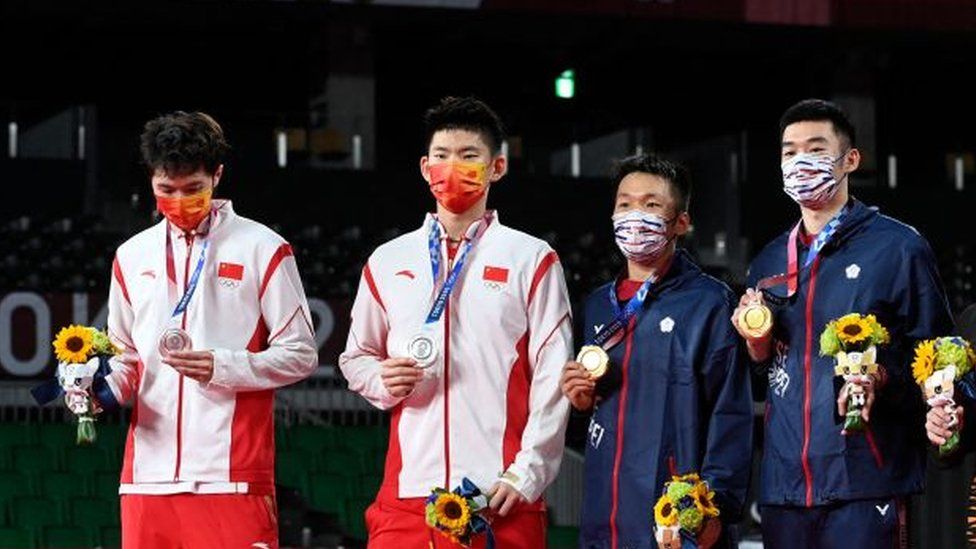The pressure on Chinese athletes to perform has never been higher. Anything less than a gold is being seen as athletes being unpatriotic by furious nationalists online. The BBC's Waiyee Yip reports.
China's mixed doubles table tennis team made a tearful apology at the Tokyo Olympics last week - for winning a silver medal.
"I feel like I've failed the team... I'm sorry everyone," Liu Shiwen said, bowing in apology, tears welling in her eyes.
Her partner, Xu Xin, added: "The whole country was looking forward to this final. I think the entire Chinese team cannot accept this result."
Their finals loss against Japan in a sport they usually dominate had left many online furious.
On microblogging platform Weibo, some "keyboard warriors" attacked the pair, saying they had "failed the nation".
Others made unsubstantiated claims of referee bias towards Japan's Jun Mizutani and Mima Ito.
As nationalist fever continues to sweep the country, racking up the Olympic medal tally has become much more than just sporting glory.
"To these people, Olympic medal tables are real-time trackers of national prowess and, by extension, of national dignity," said Dr Florian Schneider, director of the Netherlands' Leiden Asia Centre.
"In that context, someone who fails at a competition against foreigners has let down or even betrayed the nation."
The table tennis match was an especially bitter pill to swallow because it had been a loss to Japan, with which China shares a tumultuous history.
Japan's occupation of Manchuria in northern China in 1931 before a wider war began six years later, killed millions of Chinese. It is still a sore point between the two nations.
To Chinese nationalists, then, the match was not just an athletic event, Dr Schneider said. "It's a stand-off between China and Japan."
Anti-Japanese sentiments on Weibo ran high throughout the match, as users called Mizutani and Ito all manners of names.
But it's not just Japan - or table tennis.
China's Li Junhui and Liu Yuchen were targeted online when they lost their badminton doubles final to Taiwan.
"Are you guys not awake? You didn't put in any effort at all. What crap!" one Weibo user said.
Tensions between China and Taiwan have soared in recent years.
China sees Taiwan as a breakaway province, but many Taiwanese people disagree and want a separate nation.
Other targeted athletes included sharpshooter Yang Qian - despite her taking the Tokyo Games' first gold medal.
Her downfall? An old Weibo post where she had showed off her Nike shoe collection.
People were not pleased, given how the brand is among those boycotted for its pledge to stop using Xinjiang cotton over forced labour concerns.
"As a Chinese athlete, why do you have to collect Nike shoes? Shouldn't you lead the way in boycotting Nike?" one comment read.
Yang has since deleted the post.
Her teammate Wang Luyao also faced anger when she failed to make a spot in the women's 10m air rifle final.
"Did we send you to the Olympics to represent the country just to be weak?" one comment said.
Criticism of her was so overwhelming that Weibo suspended the accounts of some 33 users, local media said.
'Little pinks'
Given the competitive nature of the Olympics, people getting upset over any losses is, of course, hardly unique to China.
In Singapore, star swimmer Joseph Schooling received harsh trolling after failing to defend his 100m butterfly crown last week.
The censure got so vile that several government leaders, including President Halimah Yacob, came out calling for support for him.
But the outrage seen online in China is arguably more pronounced, and not just because its population is massive and internet-savvy.
"The so-called 'little pinks', or youngsters with strong nationalist feelings, have a disproportionate voice online," said Dr Jonathan Hassid, a political science expert at Iowa State University.
"In part, this voice is amplified because legitimate criticism of the state is increasingly unacceptable."
Nationalism in China has risen sharply in recent years as its global influence grows and any international criticisms are seen as attempts to target its development.
The Olympics also came hot on the heels of the China Communist Party's (CCP's) 100th anniversary celebrations on 1 July, where President Xi Jinping made a defiant speech about how China would never be "bullied" by foreign powers.
"The authorities have flagged nationalism as the correct way to understand current affairs, and now citizens are turning to that framework when they need to make sense of China's role in the world," Dr Schneider said.
"The Chinese public have been told that national success matters, and now Chinese athletes must deliver this success in Tokyo."
Dr Schneider and other experts noted however, that these angry reactionary nationalists most likely do not represent the Chinese majority.
Dr Hassid said: "If the only voices consistently allowed are the loudest nationalists, we should not be surprised that their voices can dominate online discussion far out of proportion to their actual numbers."
Amid the outrage seen on Weibo, there was also wide support for Team China, with some calling out the trolls for being "unreasonable".
State media also called on the public to be more "rational".
"I hope that all of us in front of the screen will establish a rational view of gold medals, and of victory and defeat, to enjoy ... the Olympic spirit," a Xinhua News Agency commentary said.
Experts say this is indicative of where the "danger" lies - when nationalism appears to have gone too far, even for the state.
"The CCP tries to exploit online nationalism for its own purposes, but events like this show that once Chinese citizens get riled up, the state has great difficulty in controlling these feelings," Dr Hassid said.
"Exploiting nationalist sentiment is like riding a tiger. Once on board, it is difficult to control and hard to get off."
https://www.bbc.com/news/world-asia-china-58024068

